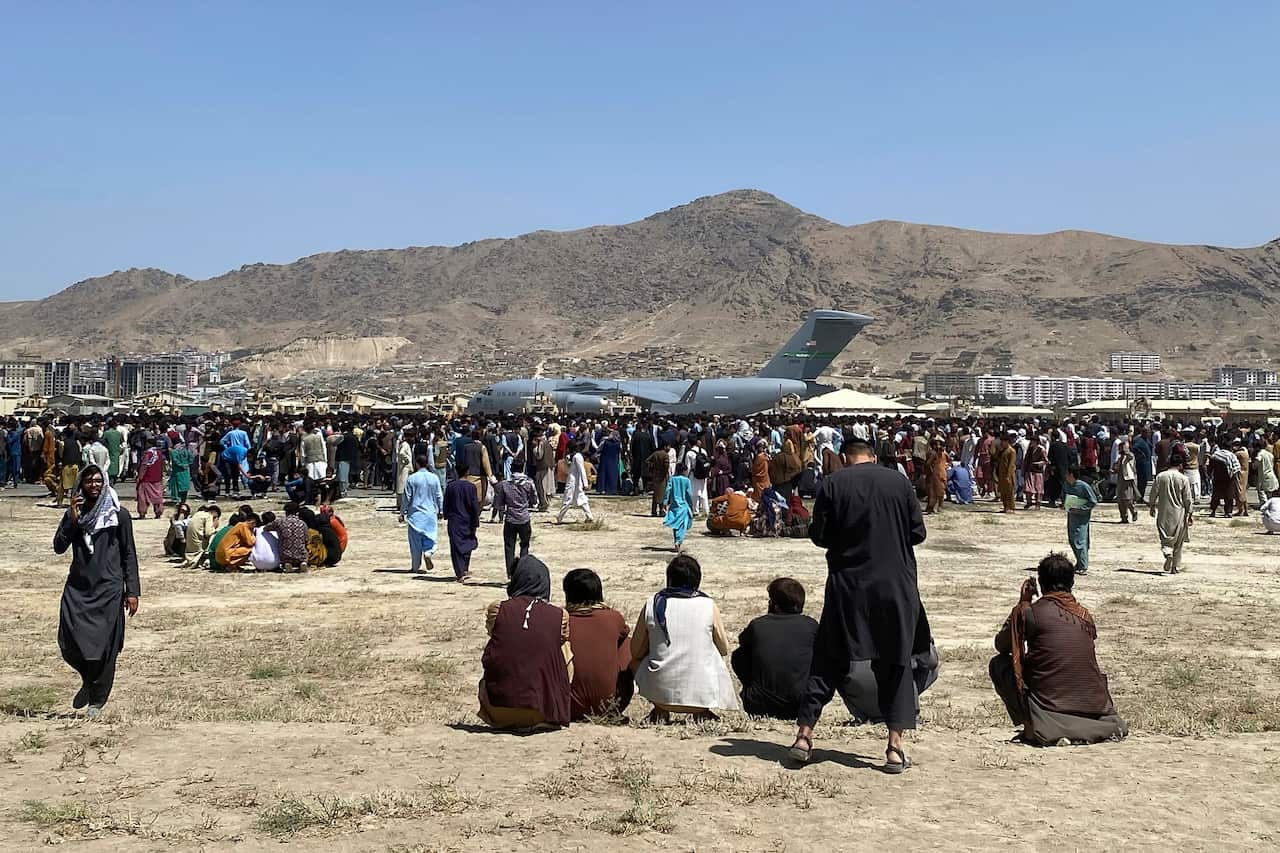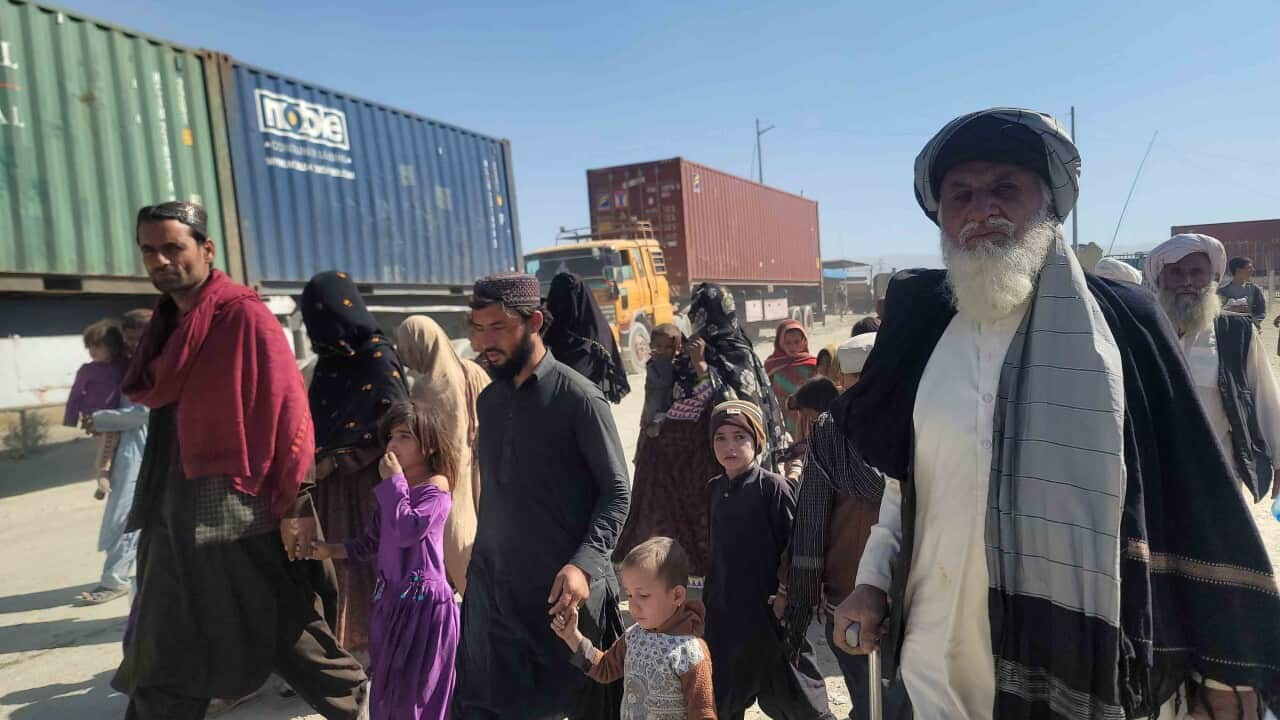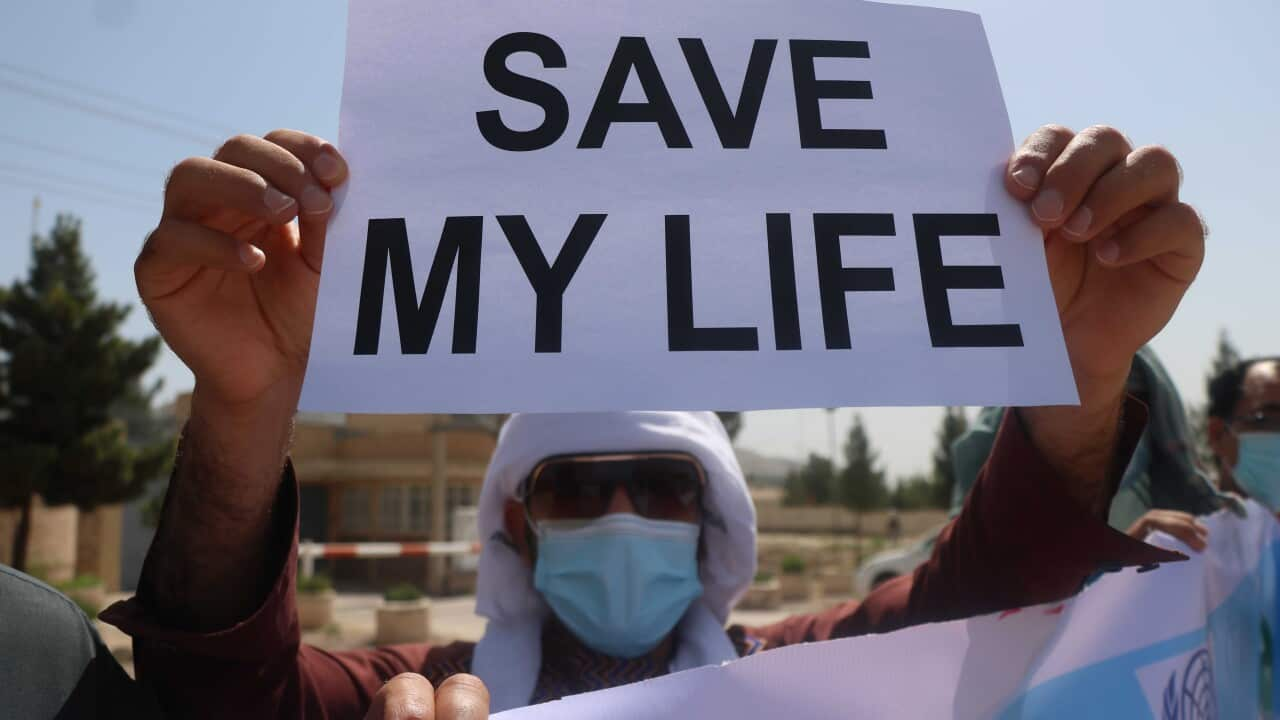Key Points
- The Pakistani government says all ‘undocumented’ Afghan nationals must leave the country by 1 November or face deportation.
- Human rights bodies have condemned the decision, which impacts an estimated 1.7 million Afghan refugees.
- Since 15 August 2021, Australia has granted 13,612 permanent humanitarian visas to Afghan citizens
Disregarding calls by local and international human rights bodies, the Pakistani government plans to go ahead with rounding up and deporting 'undocumented' Afghan refugees back to the war-ravaged country after setting a deadline of 1 November 2023.
The aftershocks of this decision are resonating worldwide among the Afghan diaspora, including in Australia.
Where will my children go?
Brisbane-based Yasmeen Nazaryar managed to escape Taliban persecution in Afghanistan by risking her own life, but two years have passed since she tried to get her three children to safety.
She told SBS Urdu that her three children - two daughters and a son - are anxiously waiting to sort out their Australian visas in Pakistan but are now faced with the grim threat of deportation.
Last night, my children phoned me and told me their landlord asked them to leave within two weeks, after police directed all landlords to force Afghan refugees out. My kids are very afraid and asking me where will they go.Yasmeen Nazaryar
As the Taliban rose to power in Afghanistan in August 2021, thousands of refugees fled to neighbouring Pakistan to escape persecution.
There, they joined over a million of their compatriots struggling to settle and integrate since their arrival during the Soviet invasion of Afghanistan over four decades ago.
Together, both groups of Afghans now make up the largest number of refugees living in the cities, villages and towns of Pakistan.
Conservative estimates by UNHCR, the UN Refugee Agency, suggest about 1.3 million Afghan refugees are legally registered with them and 88,000 others also have legal justification to stay.
However, Pakistan’s interim interior minister, Sarfaraz Bugti, has stated that 1.7 million Afghan refugees are living illegally in Pakistan and “must exit” before 1 November.
In a statement supplied to SBS Urdu, the High Commissioner for Pakistan to Australia, Zahid Hafeez Chaudhri, said, "Pakistan will continue to host over 1.4 million Afghan refugees who are registered with the Government of Pakistan with generosity and empathy despite our resource constraints and economic challenges."
The policy is aimed at deporting all illegal individuals irrespective of their nationality including unregistered and undocumented Afghans in a phased, timely and orderly manner.Zahid Hafeez Chaudhri, High Commissioner for Pakistan to Australia
Just like Ms Nazaryar’s children, many newly arrived Afghan refugees are camping in Islamabad and other cities while they wait for humanitarian visas from western countries.
According to Ms Nazaryar, her two daughters and one son have submitted applications for Australian visas and have also completed biometric registration and medical tests.
"I don't know when they will get the visa and why it is taking so long when five months ago all their work was done, and they were just waiting for the Australian visa," she said.
In an attempt to justify the looming deadline, Pakistani authorities have pointed to recent terrorist incidents in the country they say were carried out by Afghan nationals.
At a recent press conference, Mr Bugti claimed, "Since 1 January, 14 of the total 24 suicide bombers in Pakistan have been Afghan nationals."
Reacting to this, the Afghan Embassy in Islamabad accused the Pakistani police of conducting a "brutal" operation against Afghan refugees and of indiscriminately arresting women and children.
In a statement posted on X (formerly Twitter) last week, the Afghan Embassy said more than 1,000 Afghans, half of whom had a legal right to stay in Pakistan, had been detained in the past two weeks.
As no government in the world has officially recognised the Islamic Emirate of the Taliban as the official and legitimate government of Afghanistan, there is no active embassy of Australia or any other Western country in Kabul that can proceed with visa processing for asylum seekers. Therefore, many Afghan refugees have been turning to Pakistan.

Hundreds gather near a U.S. transport plane at the perimeter of Kabul's airport. Source: AAP
‘They will kill us’
Ahmad* worked as a convoy interpreter with an Australian security company between 2007 and 2012.
During his work, he survived numerous ambushes and confrontations with the Taliban. However, three months after the Taliban entered Kabul, he was arrested and “remained in jail for nine months”.
After his release, he escaped to Pakistan, but now he is concerned that if he is forced to return to Afghanistan, he will be killed.
“In this one month [since they announced the deportation of illegal refugees], it has been a very difficult time for Afghans. No one is renting their homes to them and hospitals don’t accept them,” he said.
“For about five years, we fought (against) the Taliban and I have documents and my videos are available on YouTube. The Taliban never accept their enemies.”
Not only me but all the police, army, intelligence personnel and interpreters - everyone who cooperated with ISAF [International Security Assistance Force] and foreigners will be targeted.Ahmad*
Ahmad* applied for an Australian humanitarian visa after the fall of Afghanistan, but since receiving a case number from the Department of Home Affairs, he has not received any updates.
He is calling on the Australian government to “support all those who have assisted them” during their presence in Afghanistan and “urgently process” their applications.
“At the beginning, we didn't have any enmity with the Taliban. But since working and supporting the people of Australia [in Afghanistan] as an interpreter and receiving a salary from them, the Taliban have considered us as spies,” Ahmad* said.
“For those whose lives are in danger, those who have documents and Australia genuinely intends to evacuate within a month, six months or a year, issue them documents for now, talk to the Interior Ministry of Pakistan and share their names so that we can remain here and expedite the visa processing.”

Ahmad*, during his work inside Kandahar Regional Distribution Centre. Credit: Supplied
Families torn apart
Melbourne-based Haris Tarakil was just 12 when he fled Afghanistan in 2021, managing to board an evacuation flight from Kabul but leaving his family behind.
Now, his parents and siblings in Islamabad are in a fix due to the impending deadline announced by the Pakistani government.
SBS Urdu has learnt Haris lives in foster care with strangers who he didn’t know until the day he moved in. His family completed all their health checks, biometric registration and interviews two months ago, but now face deportation due to overstaying their term of stay in Pakistan.
International human rights organisations such as Amnesty International and Human Rights Watch have criticised the decision and requested the Pakistani government not to forcibly deport Afghan refugees.
The United Nations High Commissioner for Refugees (UNHCR) and the International Organization for Migration (IOM) said in a joint statement that they appreciated Pakistan's generous hospitality to Afghan nationals for more than four decades despite difficulties.
They expressed concerns that the forced repatriation of Afghan nationals could result in serious human rights violations, including the separation of families and the deportation of children.
Mr Chaudhri said Pakistan has been helping its "Afghan brothers and sisters" despite challenges.
"In addition to hosting millions of Afghan refugees, we have provided thousands of scholarships to Afghan boys and girls to study at our best universities," he said in a statement.
According to refugee rights activist, Rebecca Farzam, the Australian government could save many refugees waiting for their humanitarian visas by expediting the process.
The Department (of Home Affairs) aims to process the applications in 90 days, but people were waiting on average for two and a half years for their initial protection decision.Rebecca Farzam, refugee rights activist
When contacted for comment, the Department of Home Affairs said Australia continued to work closely with the Government of Pakistan to raise issues impacting the departure of refugees, including Afghan refugees with Australian visas.
“The Government is committed to supporting the Afghan community, with 16,500 places allocated for Afghan nationals under the Humanitarian Program delivered over four years from 2022-23 to 2025-26. This is in addition to the 10,000 places for Afghan nationals within the Offshore Humanitarian program over the same period,” a Department spokesman said.
Since the fall of Kabul on 15 August 2021, up until 31 August 2023, Australia granted 13,612 permanent humanitarian visas to Afghan citizens under the offshore humanitarian program.
This story was produced in collaboration with SBS Pashto.


